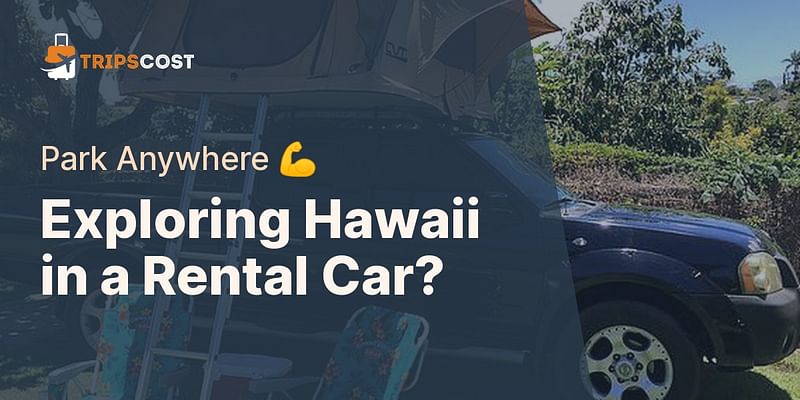Kayley is an expert luxury travel blogger, famous for her experiences in the world's most sumptuous hotels. Her passions include high-end dining and rejuvenating spa retreats. When not on the move, Kayley spends her time practicing yoga and meditation.
Answer: When it comes to camping across Hawaii and parking your rental car, there are a few important things to keep in mind. While Hawaii offers breathtaking natural beauty and a variety of campsites to explore, it's essential to understand the rules and regulations regarding parking your rental car.
In general, parking your rental car while camping in Hawaii is not as straightforward as it may seem. The rules and restrictions vary depending on the specific campsite and the island you're visiting. To ensure a smooth and hassle-free camping experience, it's crucial to familiarize yourself with the guidelines.
First and foremost, it's important to note that camping in Hawaii requires a permit. You'll need to obtain a permit for each campsite you plan to stay at, and these permits often come with specific instructions regarding parking. Some campsites have designated parking areas, while others may require you to park your rental car in a separate lot nearby.
Hawaii Camping Permit and Parking Information
| Campsite Name | Permit Required? | Parking Instructions | Estimated Permit Cost |
|---|---|---|---|
| Waiʻānapanapa State Park | Yes | Designated parking area | $12 per night |
| Nāpali Coast State Wilderness Park | Yes | Park in nearby lot | $20 per night |
| Kīholo State Park Reserve | Yes | Designated parking area | $5 per night |
| Polihale State Park | Yes | Park in nearby lot | $18 per night |
| Mālaekahana State Recreation Area | Yes | Designated parking area | $9 per night |
When it comes to parking your rental car at a campsite, it's important to follow the rules and regulations set by the campsite management. Some campsites may have limited parking spaces, and it's crucial to respect these limitations to avoid any inconvenience or penalties.
Additionally, it's worth noting that some campsites in Hawaii do not allow overnight parking for rental cars. This is especially true for more remote or secluded campsites. In such cases, you may need to make alternative arrangements, such as parking your rental car at a nearby parking lot or arranging transportation to the campsite.
To ensure a smooth camping experience and avoid any surprises, it's always a good idea to research and plan ahead. Look up the specific rules and regulations for each campsite you plan to visit. Many campsites have websites or online resources where you can find detailed information about parking and other important guidelines.
If you're unsure about the parking situation at a particular campsite, don't hesitate to reach out to the campsite management for clarification. They will be able to provide you with accurate and up-to-date information regarding parking your rental car.
Lastly, to make the most of your camping adventure in Hawaii, it's always a good idea to consider alternative transportation options. Depending on the location and accessibility of the campsite, you may find it more convenient to use public transportation, hire a shuttle service, or even rent bicycles to explore the area.
Transportation Options for Camping in Hawaii
| Transportation Type | Average Cost | Pros | Cons |
|---|---|---|---|
| Public Transportation | $2-$5 per ride | Affordable, Eco-friendly | Limited routes, Not available 24/7 |
| Shuttle Service | $20-$50 per person | Convenient, Direct to campsite | Can be expensive, Need to book in advance |
| Bicycle Rental | $15-$30 per day | Flexible, Healthy and fun | Not suitable for long distances, Weather dependent |
| Car Rental | $40-$80 per day | Comfortable, 24/7 availability | Expensive, Parking issues |
In conclusion, while camping across Hawaii and parking your rental car may require some extra planning and consideration, it's definitely possible to enjoy the beauty of the islands. By familiarizing yourself with the rules and regulations of each campsite, planning ahead, and exploring alternative transportation options, you can have a memorable and stress-free camping experience in Hawaii.










